The Chernihiv newspaper “Visnyk Ch” is far from an ordinary regional print publication. Prior to the war, with a circulation of 34,500 copies, it was among the top five newspapers in terms of circulation in all of Ukraine, and it appears to maintain that status to this day. How does this unique regional media outlet manage to survive today when the war has ruthlessly impacted Chernihiv, claiming lives, destroying homes, and crippling infrastructure? This story is brought to you by the National Union of Journalists of Ukraine.
According to Serhii Tomilenko, the head of the National Union of Journalists of Ukraine, “Visnyk Ch” is a remarkable phenomenon in Ukrainian journalism.
He states, – It exemplifies dedication to readers, the audience, and the media business. Tomilenko goes on to emphasize that “Visnyk Ch” is a genuinely independent newspaper that, thanks to the determination of its team and its chief editor, has remained successful and profitable for decades. Unfortunately, the war has disrupted the market, and the publication is currently facing certain challenges. Nevertheless, it is making efforts to return to a sustainable model.
The newspaper claims that the “secret to success” of “Visnyk Ch” is simple: if you want to have a substantial readership, you must write for a mass audience. This does not mean sensationalizing content, but rather presenting it in a way that is accessible to all, from local officials to ordinary rural residents.
Valentyna Tymoshko, a co-founder of the publication and a journalist, notes, – We never limit ourselves to press releases; we verify everything ourselves. Even when it’s inconvenient, when sources are reluctant to talk to us, we go to them and inquire. We always provide the perspective of both sides, whether one is a bribe-taker or an assailant. We don’t ‘sanitize’ the direct language of ordinary people; we retain strong expressions and vivid language.
Editor-in-chief Serhii Narodenko explains that when preparing their materials, they aim to reach the typical family, and every journalist, regardless of the topic, keeps this image of their readers in mind.
– Our entire editorial team comes from the people, as they say. So, we know what the people want, what they think, what they care about, and how to present information in a way that they will read and say, ‘Well done! That’s right!’ – stresses the editor, as highlighted by the National Union of Journalists of Ukraine. The content should be oriented toward the mass readership.
“Visnyk Ch” is a news-oriented socio-political weekly. Contrary to the common belief that modern newspapers lose out to the internet in delivering news and, therefore, should focus on something else, “Visnyk Ch” primarily provides news from the Chernihiv region. Additionally, the publication features compelling stories, often with happy endings, about individual destinies.
According to Serhii Narodenko, “Visnyk Ch” is a “dedicated print” publication that has no equivalent on the internet.
– Research shows that online readers and print readers are quite different. They seem to be from different planets. If we were to publish ‘Visnyk Ch’ content on a website, it would not be interesting to anyone. The internet requires an entirely different kind of content.
However, in the current circumstances, when not everyone can afford a printed newspaper, the editorial team has decided to publish a PDF version of “Visnyk Ch” on a website.
– It’s interesting that our information still finds its way to online publications, – says journalist Valentyna Tymoshko. – Various outlets frequently reprint our articles. Moreover, our publications often become topics for various television talk shows.
“It is a publication that is truly independent.”
– In the past, we had 65,000 copies in circulation. In the first half of this year, it dropped to 34,500 due to the war. We’re seeking grant assistance temporarily, but we’ll launch a new subscription drive in October. We anticipate a circulation recovery as the situation stabilizes.
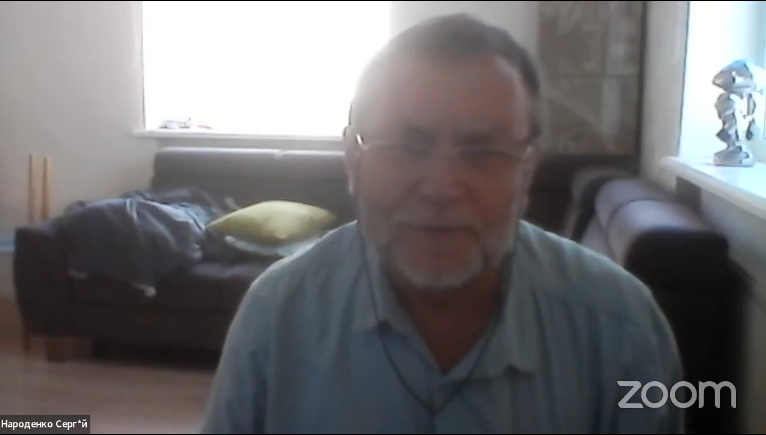
Before 2004, ‘Chernihiv Visnyk’ was under regional administration control. Serhiy Narodenko, a legal expert, ingeniously made it independent, becoming ‘Visnyk Ch’ and boosting its circulation.
Since then, the publication’s goal has not been to generate revenue from the regional budget or to constantly remain in opposition.
– ‘Visnyk Ch,’ a genuinely independent publication, consistently adheres to journalistic standards, unlike some electronic media and local television channels owned by local oligarchic groups, – noted by Andrii Podorvan, an advisor to the head of the Chernihiv Regional Military Administration. He added, – I am a government official, and ‘Visnyk Ch’ often criticizes the government, but I must acknowledge that this publication presents a well-balanced view.
While many local publications struggle with funding, government neglect, and the unfriendly policies of ‘Ukrposhta’ [National postal service] after the privatization, ‘Visnyk Ch’ operates as a self-reliant business.
‘Visnyk Ch’ has always focused on constructive work, – said Olena Doroshenko, head of the Chernihiv Regional Directorate of ‘Ukrposhta.’ – Since I took my current position in 2017, our relationship with the editorial team has been exclusively constructive. If there are issues, we work on them together and resolve them. This fosters cooperation, and we do not hear any sharp criticism from the editorial team. Serhii Narodenko, when introducing mobile branches at ‘Ukrposhta,’ empathized with our need for efficient service. We’ve now established a delivery schedule for our Wednesday newspaper, prioritizing automated postal service points, with a gradual reach to smaller villages, and remote areas by Tuesday at the latest. We collaborate with the editorial team to expedite delivery.
When the war began…
The war cut off the road to Kyiv, where ‘Visnyk Ch’ was printed. Parts of Chernihiv were occupied, postal services stopped, and the team faced evacuations and sheltering due to bombings, resulting in a temporary suspension of the publication.
– Of course, it was impossible to work in those conditions, – says Serhii Narodenko. – Let me tell you about myself: one March night, my father-in-law and I were woken up by a tremendous explosion. We immediately took cover in the basement of our house. Explosions followed one after the other, and the house was shaking. This continued for about ten minutes. When it stopped, we came out. It was pitch dark. I lay down, covered myself for warmth, and fell asleep again.
In the morning, I ventured outside to find my small alley in the private sector riddled with massive craters from projectiles fired by an automatic cannon, some just meters away from my house. It caused significant damage, with 5 shattered windows, debris covering everything, and 8 shrapnel holes in my car.
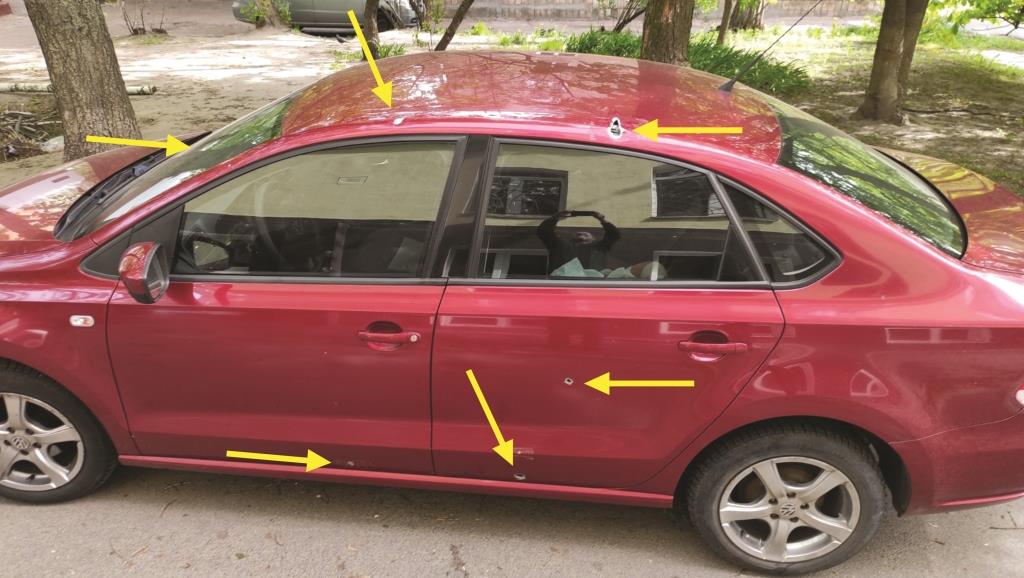
Fortunately, the editorial office located in the historical center of Chernihiv was not affected, although the nearby Hotel “Ukraine” turned into ruins. To preserve the team, the editorial office financially supported its employees from the reserves accumulated earlier and with the help of grant funds, including from the National Union of Journalists of Ukraine (NUJU).
On May 12, ‘Visnyk Ch’ resumed publication.
– The restoration of this newspaper’s publication is of great significance for Chernihiv. The publication has many subscribers in various districts, including those bordering neighboring hostile states. In many communities, Russian television and radio signals are well received. Therefore, it is essential that, thanks to ‘Visnyk Ch,’ Ukrainian print media is present in these communities. – said Andrii Podorvan, an advisor to the head of the regional administration.
Despite the circumstances of the war, the editorial team continues to work at full capacity.
– All members of the team gathered in Chernihiv and said, ‘We want to continue working.’ We have a great atmosphere at work, people are friendly and in good spirits. And we started publishing the newspaper again, – explained Serhii Narodenko.
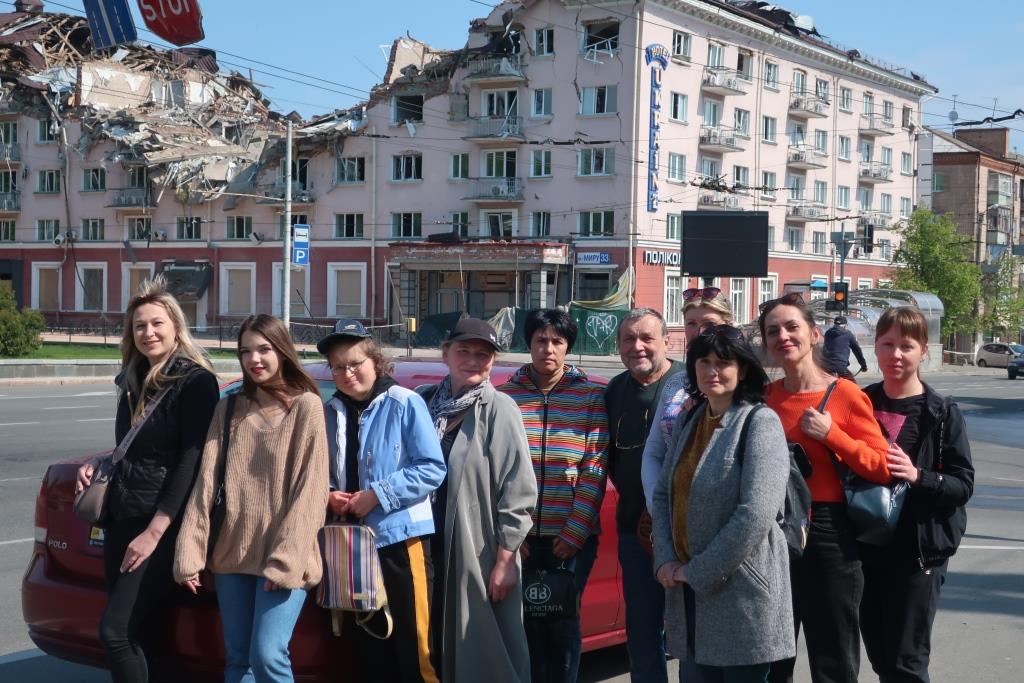
While Chernihiv is no longer under occupation, the topics related to the war continue to be at the forefront of journalists’ and readers’ attention.
– We write about the tragedy of the residents of the village of Yahidne, where people were shot and tortured, where people died from suffocation due to inhumane treatment by occupiers and went insane, – says journalist Valentyna Tymoshko. – Some say it’s a ‘fake,’ but those of us who have been there know the horrifying truth and convey it to the people. We write about the story of a man who made Molotov cocktails himself to slow down the advance of the occupiers until our troops could secure better positions. Later, this man was shot with a rocket launcher, and to save him, a veterinarian had to operate on him in almost total darkness. We write about the funerals of each local resident who dies on the front line. We try to attend every funeral. We also write about how the families of prisoners of war are coping; these families have lost their breadwinners. Few people are aware of this issue. Therefore, we want to be helpful to our readers and show them the real picture of life.
The publication dedicates a lot of attention to issues that Chernihiv may face or is currently experiencing. Will there be a gas supply to homes, and if so, at what cost? How to survive in an apartment without electricity? How to endure shelling in border villages? How to obtain a driver’s license at the Center of Administrative Services? People look to the newspaper for defenders, advocates, and the last instance that can help.
– We try to assist because the newspaper ‘opens many doors’ and compels officials to act within the law, – says Valentyna Tymoshko.
Advertising revenue has plummeted by two-thirds since the pre-war period. Many businesses closed, entrepreneurs left, and those remaining often lacked funds for promotion. Despite this, advertising persisted, appearing in the first issue after the occupation.
– Our regular advertisers know that advertising in ‘Vysnyk Ch’ works, – says the editor. – Over time, it even increased slightly. However, it’s essential to consider that it’s summer now, and even in peacetime, ad revenues tend to decline during this period.
The editorial office was concerned that subscriptions might decline due to the war’s impact on the population and postal service issues. However, subscriptions for the second half of the year remained stable.
– I’m proud to say that although we initially expected a maximum of 5,000-6,000 subscribers, there turned out to be as many as 23,000! Of course, compared to pre-war times, this is a significant decrease, but we understand that it could have been much worse, – says Serhii Narodenko. – We even planned to provide free subscriptions to all our former subscribers by the end of the year. However, we couldn’t find the funds for it, and thanks to God and our readers, most of them managed to re-subscribe to our publication. As of now, I believe we remain among the top five newspapers in Ukraine in terms of circulation.
Due to financial constraints, the newspaper can now only print eight pages, while the costs for paper and printing services have risen significantly. Travel from Kyiv is more difficult, taking over 4 hours instead of the previous 1.5-2 hours, prompting the use of printing services in Chernihiv.
– The current subscription price is based on 8 newspaper pages. Of course, this is not what we aim for. To produce a proper newspaper, we need one-time assistance from grant providers. We highly rely on their support, – says the editor. – We have employees, premises, equipment, and transport. To fully restore our operations, we only lack the funds to increase the newspaper’s volume to the pre-war level.
As emphasized in the editorial office, over the past two decades under Serhii Narodenko’s leadership, the newspaper has been profitable. In the last three years alone, it has paid approximately UAH 800,000 in corporate income tax.
– The National Union of Journalists will make efforts to help ‘Vysnyk Ch’ restore its operations to pre-war standards, – noted Serhii Tomilenko, Chairman of the National Union of Journalists of Ukraine, during the All-Ukrainian conference of editors and media leaders on ‘Surviving in Wartime Conditions.’ – Even a long-profitable project faces wartime challenges, but Serhii Petrovych Narodenko affirms the publication’s self-reliance, with grant funds providing a boost for its development.
This series, titled Executed Free Speech, is created as part of a project Drawing Ukrainian And International Audience’s Attention To Serious Violations Of Human Rights And Crimes Against Journalists And Mass Media By The Russian Federation, which is performed by the National Union of Journalists of Ukraine, with support from the Swedish non-profit organization Civil Rights Defenders.
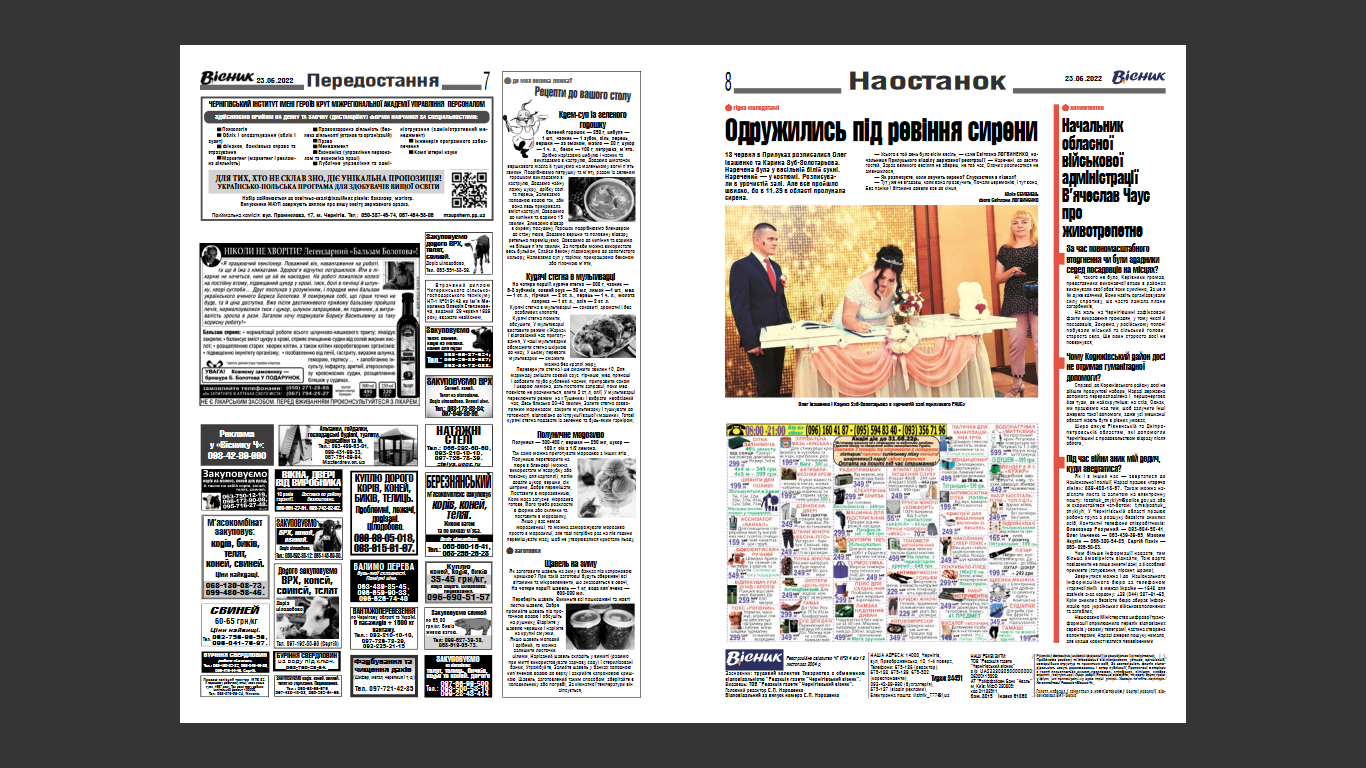
JOURNALISTS ARE IMPORTANT. Stories of Life and Work in Conditions of War is a cycle of materials prepared by the team of the NUJU with the support of the Swedish human rights organization Civil Rights Defenders.
#CRD

 THE NATIONAL UNION OF
JOURNALISTS OF UKRAINE
THE NATIONAL UNION OF
JOURNALISTS OF UKRAINE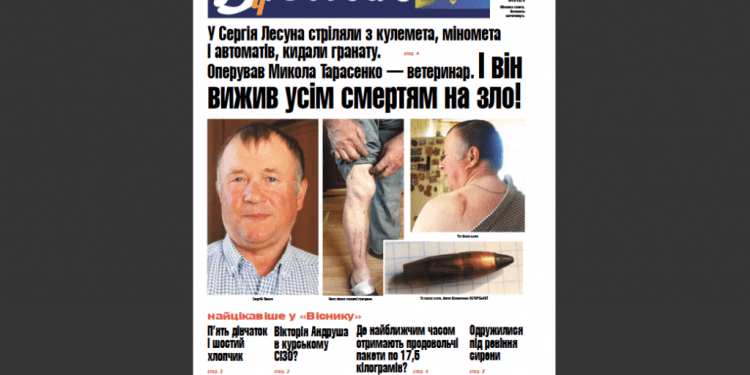
















Discussion about this post